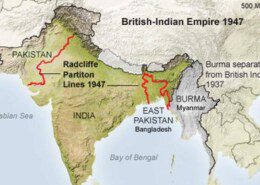The Non-Cooperation Movement continues to be a turning point in the history of the Indian freedom struggle, even though the Chauri Chaura incident temporarily slowed down the movement’s pace. Talk about it. (Answer in 250 words)
Access to Western Thought: English education made available to the Indians, the samples of western literature, philosphical thoughts and political ideas based on such principles as liberty, equality, and government by consent. Emergence of an Intellectual Class: The so-called ‘Brown Sahibs’ appearedRead more
Access to Western Thought: English education made available to the Indians, the samples of western literature, philosphical thoughts and political ideas based on such principles as liberty, equality, and government by consent.
Emergence of an Intellectual Class: The so-called ‘Brown Sahibs’ appeared; the Indians who were educated. They were protesters of colonialism and whenever educated, they would use their education to complain against exploitation.
Formation of Nationalist Sentiments: So, the educated persons especially the English-educated Indians contributed to the emergence of nationalist opinions regarding self-governance as well as social emancipation.
Political Participation: Thus, educated Indians initiated and participated in the political tone, which fostered the development of Indian nationalism.
Leadership Development: Some of the main leaders of the nationalists were Raja Ram Mohan Roy, Dadabhai Naoroji, Mahatma Gandhi, and Jawaharlal Nehru all came from English educated background. They applied education in the fight for liberation, and that education set them apart.
Unity and Resistance: It began to be not only an official language of administration but also a language of freedom struggle and as a tool to fight against colonialism.
Impact on Independence Movement: The socialisation process of education moreover fostered the capacities of Indians with the ideas and the means to wrestle out Britain’s domination.
Therefore, the provision of English education in India by the British eventually rooted for such anti-imperialism educated class, fanned nationalism and offered leaders for the liberation of their country.
See less



The Non-Cooperation Movement (1920-1922), despite the setback of the Chauri Chaura incident, stands as a watershed moment in the Indian freedom struggle. Initiated by Mahatma Gandhi in response to the Jallianwala Bagh massacre and the Rowlatt Act, the movement marked the first mass mobilization agaiRead more
The Non-Cooperation Movement (1920-1922), despite the setback of the Chauri Chaura incident, stands as a watershed moment in the Indian freedom struggle. Initiated by Mahatma Gandhi in response to the Jallianwala Bagh massacre and the Rowlatt Act, the movement marked the first mass mobilization against British rule, emphasizing non-violent resistance and civil disobedience.
The movement’s objectives were to attain Swaraj (self-rule) by urging Indians to withdraw their cooperation from the British administration. This involved boycotting British goods, institutions, and honors, and promoting indigenous industries like khadi. The movement rapidly gained traction, drawing millions from various strata of society, including peasants, workers, and students, creating a unified front against colonial rule.
The Chauri Chaura incident in 1922, where protesters clashed violently with the police, leading to the death of 22 policemen, caused Gandhi to abruptly call off the movement. He believed that the incident indicated a loss of control over the movement’s non-violent principles. While this decision was controversial and led to a temporary demoralization among supporters, it underscored Gandhi’s unwavering commitment to non-violence.
Despite this interruption, the Non-Cooperation Movement left a lasting legacy. It demonstrated the power of mass mobilization and civil disobedience, setting the stage for future movements. It also marked a shift in the Indian National Congress’s strategies from moderate constitutional methods to more radical, direct action, significantly altering the dynamics of the freedom struggle.
Moreover, the movement fostered a sense of national unity and consciousness, essential for the sustained efforts that followed. It catalyzed the rise of new leaders and ideologies within the Indian freedom struggle, paving the way for subsequent movements like the Civil Disobedience Movement and the Quit India Movement. Thus, the Non-Cooperation Movement remains a pivotal episode in the history of India’s quest for independence, exemplifying the potential of collective non-violent resistance.
See less